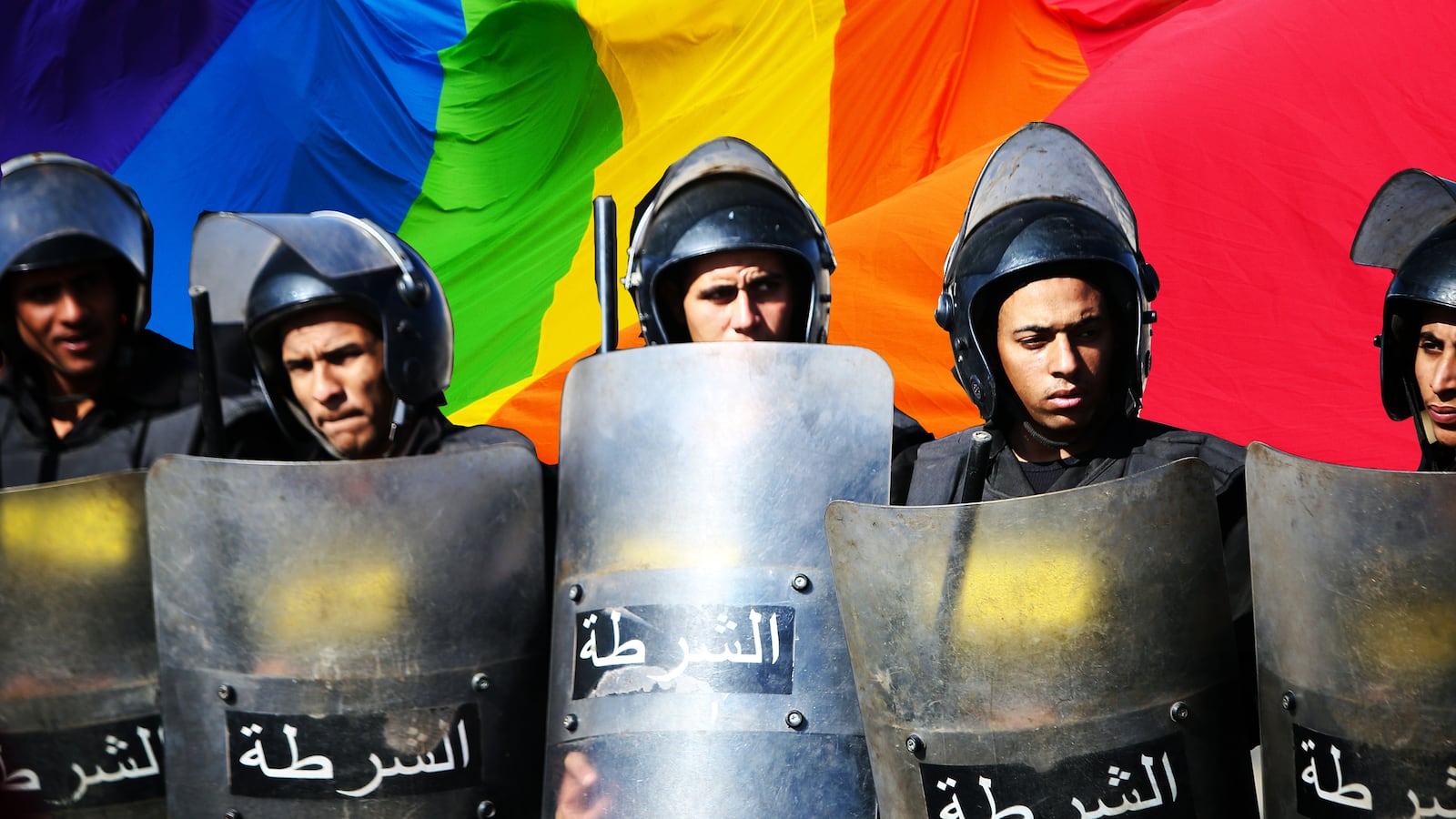CAIRO—The young gay Egyptian man had been chatting to a guy he met on a popular gay hook-up app for two weeks before he plucked up the courage to ask him on a date. (As with other contributors to this piece, The Daily Beast is not naming him, to protect his identity and safety.)
Nothing about his partner’s online profile raised alarm for the young man. The pair agreed to meet in a discreet downtown café popular with members of the LGBTQ community who have to keep a low profile in Egypt where they are targeted by the security forces.
But instead of seeing his new friend, three low-ranking policemen and an officer in plain clothes were waiting. No one dared intervene as they silently dragged the young man into the back of a police car.
A “habitual debauchery” case had already been prepared against him at the police station. The man was swiftly sentenced and locked up for a year, his life destroyed.
This is just one of many horror stories told by members of the LGBTQ community, who are facing the worst crackdown in the history of Egypt.
Being gay in Egypt is not in fact illegal, but the state uses catchall terms like “debauchery” and “sexual deviance” to lock up those accused of being homosexual. The Egyptian public, which is increasingly conservative, often cheers from the sidelines.
Since Sept. 19 at least 70 men and women accused of being gay have been rounded up, according to the Egyptian Initiative for Personal Rights (EIPR). In that short period 27 have been convicted and handed jail terms of between six months and six years.
This is the highest number of arrests ever recorded in Egypt, EIPR says. It even tops the notorious 2001 raid on the Queen Boat, a floating nightclub on the Nile. Back then 52 men were arrested and 21 of them were handed three-year jail sentences.
The police have not only intensified their crackdown in recent weeks but shifted tactics from high-profile public raids to, as with the case outlined above, focusing on online entrapment.
“Technology is making it easier to meet people very quickly online. The police use fake photos of foreigners like Saudis, and some even use photos belonging to detainees, whose phones they have confiscated,” said a thirtysomething man, a friend of the jailed man mentioned above, who was jailed himself in 2015 for being gay.
Now out of jail and on parole, the thirtysomething man stopped using dating apps recently when he himself was nearly caught by the police. He had added a potential love interest to a group chat after him meeting online.
“Seconds later my friend left the group chat and called me to say this was his cousin, he was definitely a police officer,” the man said. “I haven’t used apps since then.”
The latest rash of arrests was sparked by the surge of public anger when a group of people were photographed raising the rainbow LGBT flag at a pop concert in Cairo on Sept. 22.
Mashrou’ Leila, a popular Lebanese band fronted by an openly gay lead singer, was playing that night. As photos of the multicolored flags flooded social media, the state vowed to crush the LGBT movement, calling it a threat to public morals.
Two activists, Ahmed Alaa, 21, and Sara Hegazy, 28, were detained in Cairo for actually raising the flag, on charges including “promoting sexual deviance” and “belonging to a banned group” which can carry a 15-year jail sentence. Their pre-trial detention was extended by another 15 days last week.
But the rest of the detainees had nothing to do with the flags. They appear to be part of a general push by the government to appease a disgruntled public. Egypt is in the grips of grueling financial crisis: The value of the Egyptian pound has halved since a currency float last November, inflation has soared past 30 percent, and unwieldy subsidies have been slashed.
Instead of focusing on the woes of the state, Egyptian television channels, that are often censored by the authorities, have been awash with angry commentators discussing ways in which to “cure” homosexuality and save society.
Politicians have lobbied the government to toughen prison sentences against those accused of “debauchery.” The authorities have gleefully advertised the arrests.
Mahmoud Khamis, an MP from the Nile Delta’s Sharqiya, last week proposed legislation raising the maximum jail terms for “habitual debauchery” to 10 years to combat “the disgusting practices of homosexuals” after the flag-waving incident.
Shadia Thabet, a member of the parliament’s health committee, meanwhile urged jail terms for “inciting” homosexuality on social media to be raised to seven years.
Outspoken pro-regime TV presenter and MP Mostafa Bakry submitted a formal request to the parliament to ask the government to ban eight rights groups, including EIPR, that had criticized the crackdown on the LGBT community.
In the written complaint he said supporting homosexuality represented an “assault on religious beliefs, moral ideas,” was an “offense to all Egyptians,” and “violated the constitution.”
Amr Adeeb, a TV presenter at Qahira Wa Ness channel, compared homosexuality to “extremists” and people who marry and rape children.
This has all contributed to a public hysteria which is fueling new arrests, according to Ahmed Hossam, a human rights lawyer representing several detainees swept up in the crackdown. He said in the confusion the number of those arrested for being gay could be as high as 120.
“This is the worst crackdown ever recorded. NGOs only document the cases they personally know or the ones that seek help from them. This is why I think there are at least 120 cases in the recent crackdown,” Hossam told The Daily Beast. “For example, at my last trip to court where I was set to attend to two cases, when I arrived, I found nine cases.”
He said the majority of the defendants he was representing had been jailed after police officers posed as gay men on mobile phone apps. The undercover policemen were increasingly offering to pay money for sex via these dating apps in a bid to entrap vulnerable and impoverished members of the LGBTQ community.
The financial dimension complicates the case, and means charges related to prostitution can be used, lengthening the prison terms. But inciting a “criminal” to do a criminal act is illegal, Hossam said.
“Think about it, a police officer cannot contact a killer and say he wants someone killed and will pay for it, and then arrest the killer when he attempts it,” Hossam added.
Dalía Abdel-Hamid of the EIPR, which is trying to warn social media users in Egypt, said the police were becoming increasingly “sophisticated.” “In a recent case, the officer, using an online dating profile, faked a Gulf accent to his target and even sent a copy of a Saudi passport he had especially acquired.”
Alarmed by the sudden surge in arrests, U.S.-based dating apps have now issued warnings and advice in Arabic to their Egyptian users. Some of their tips include letting people know where you are going before meeting someone, checking if you have mutual friends, and trying to meet virtually through video first.
“It will make people take more precautions… we know that the police are under pressure to arrest people and they are going about doing that through all the avenues that they have,” Jack Harrison-Quintana, a director at Grindr, told Reuters this week.
Many of those accused of being gay are poorly treated in detention.
Hegazy told the prosecutor who questioned her that she was beaten and sexually harassed by her cellmates in Sayida Zeinab police station after the security forces there told them that she was charged with “habitual debauchery.”
At least five of the 70 arrested have been subjected to forced anal examinations by the authorities to “check” their orientation, which rights group say is akin to rape. Others have claimed to be repeatedly sexually assaulted once they are convicted.
A transgender woman was released from a men’s jail last month after three years behind bars for “habitual debauchery.”
She told The Daily Beast that prison guards forced her to perform sex acts, would watch her while she went to the toilet, and once stripped her naked and took photos. If she did not comply she said she was beaten, starved, and held in a pitch-black solitary confinement cell for weeks at a time, which she nicknamed “the graveyard.”
“There was a long hall with five rooms, each one was one meter by one meter, the only way out was by giving sexual favors. Those who didn’t were kept in the darkness for days and weeks,” she said. One of her friends, who was also trans, was so depressed after months behind bars she tried to kill herself with the lid of a tuna can.
Her friend was patched up, put back in solitary and all canned food was banned. “That was it. No investigation No questions. No nothing,” the transgender woman told The Daily Beast.
The Egyptian authorities declined to comment. But in the past the Interior Ministry and Egyptian President Abdel-Fattah al-Sisi himself have repeatedly denied that torture or any form of violence is used in Egypt’s detention centers. The security forces maintain the prisons are kept to international standards and there is no targeted crackdown.
The transgender former prisoner told The Daily Beast that with the surge in arrests and public sentiment galvanizing against the LGBTQ community, she now has zero options. When she was handed over to the police by an informant posing as a female pimp in 2014, the media splashed her photo and name all over the news.
So, like many of those released from jail after serving sentences for debauchery, she is trapped at home. She cannot travel abroad; the public shame means no one will hire her; her identification card still carries her original male name, causing confusion.
Her family, who tried to submit her to electric shock treatment in the past, still believes they can “cure” her.
Like her, the thirtysomething gay man interviewed above fears this is just the start, that it will only get worse. “The crackdown is very hard this time. Even under [former president] Hosni Mubarak, we were left alone unbothered. But now, there is a police state. They see us as a threat,” he told The Daily Beast, breaking down. “I stopped meeting new people because I never know if they are really homosexuals or just pretending to rob me, to report me to the police or they are the police. We are being hunted.”






